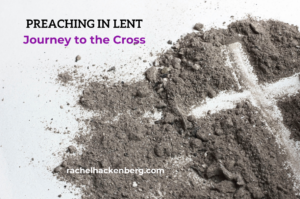With the turn of the civic calendar to a new year, the appearance of Lent is quickly on the horizon of the liturgical year—beginning with Ash Wednesday on February 14th. I’ve outlined a variety of Lenten sermon series in past years, including:
- A Word for “You” sermon series on the Year B Gospel readings;
- a sermon series on #solidarity, using the Narrative Lectionary;
- using the Year B Old Testament texts, a sermon series on injustice;
- a Lenten sermon series on hymns and another one on prayer.
For the upcoming Lenten season, I offer two new prompts for your sermon series prep:
- Journey to the Cross (below)
- Mark My Words.
For these sermon series, I’m outlining Sundays only (7 total: 6 Sundays in Lent plus Easter Sunday). These ideas do not include weekday events that are central to Lent — namely, Ash Wednesday and Holy Week. You can certainly fold those holy days into your preaching theme if you choose.

Sermon Series: Journey* to the Cross
Take up your cross and lay down your burdens. This Lenten sermon series is a loose nod to the tradition of “Stations of the Cross” (or “Way of the Cross”), a contemplative & contrite pilgrimage through Christ’s Passion. For the purpose of preaching, this sermon series highlights only 7 Passion scenes, although Stations of the Cross traditionally includes 14 scenes — and those 14 vary among Christian communities.
*Note: Be mindful of vocabulary when pontificating about the journey. We don’t all walk & run along the journey. Some of us shuffle, some of us wheel and roll, some of us use a cane or brace, some of us struggle to get started. Not everyone can see signs along the pilgrimage either, and we cannot all listen to God’s commandments. Be attentive to your word choices — even and especially for figurative use — so that the journey is accessible.
1st Sunday, Jesus is arrested (John 18:1-5 and 18:10-12)
In all 4 Gospels, a sword is drawn by a disciple to defend Jesus from arrest, resulting in the injury of a slave. It’s human nature to respond to fear with defensiveness, often displayed as anger or violence. How might we lay down the burden of our swords and the fears they protect?
2nd Sunday, Jesus is tried and sentenced (Matthew 26:57-66, 27:1-2, 27:15-17, and 27:20-22)
Jesus stands trial in religious court, civic court, and the court of public opinion. In each setting, the outcome is predetermined. How might we mitigate foregone conclusions — which burden others with our assumptions — and instead be curious, attentive, and supportive as people live into their own unique outcomes?
3rd Sunday, Simon of Cyrene carries the cross (Mark 15:16-22)
The Gospel of Mark identifies Simon’s hometown (Cyrene in Libya) as well as his family (sons Alexander and Rufus, both thought to be significant in the early Church). Simon’s journey is interrupted by Jesus’ journey. How might we set aside our desire for a singular, clear, self-focused journey and welcome the unexpected turns in the road?
4th Sunday, Jesus is mocked and disparaged (Matthew 27:33-44)
The Gospel of Matthew fills the scene at Golgotha with “bad guys”: the soldiers, the bandits, the passers-by. We like to point out “bad guys”; it helps us know we’re among the “good guys.” Can we set down the ball-and-chain worldview of “us vs. them, me vs. you” that drags down our relationships?
5th Sunday, Jesus consoles his mother (John 19:25b-27)
Mother Mary, Aunt Mary, Apostle Mary, and Apostle John stand together near the cross. Some of us keep a stiff upper lip in times of grief and stress. How might we learn to support one another, as Mary and John do in their new relationship, rather than carrying the burden of self-sufficiency?
Palm/Passion Sunday, Jesus dies and is buried (Luke 23:44-53)
“Into your hands I commend my spirit” echoes the humbling surrender of Ash Wednesday: dust to dust, breath to death. How might we hold our lives lightly, with love and joy and wonder, unburdened of the social expectations (money, status, appearance, profession) that often weigh heavily on our self-image?
Easter Sunday, The tomb is found empty (Mark 16:1-6)
They had the supplies they needed — spices, oils, cloths — but they hadn’t solved the problem of the stone in front of the tomb. Imagine the relief of a problem solved before you arrive, a burden lifted before it becomes an obstacle. Alleluia! We are burdened with the cross but relieved of the stone. Alleluia, alleluia.
Hymn suggestions with “Journey to the Cross” sermon series:
- Be Still My Soul
- Down by the Riverside
- Cast Thy Burden on the Lord

Trackbacks/Pingbacks